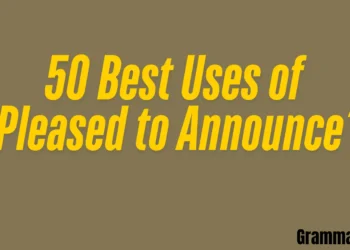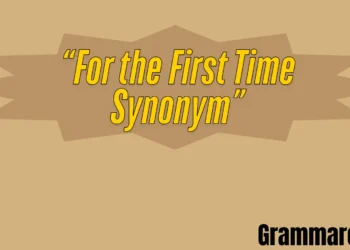Although it can be perceived as harsh or dismissal, mind your own business is frequently used to establish borders or reject unwelcome interaction. How you express this attitude affects much both in professional and social environments. Although there are times when demanding privacy is crucial, respectfully asserting it maintains respect and helps to prevent discord. The meaning of the phrase, its fit in many situations, and other means of more tactfully communicating the same idea are all discussed here. Knowing these subtleties will allow you to skillfully and professionally negotiate talks.
Is It Professional/Polite to Say “Mind Your Own Business”?
Particularly in formal or work environments, directly instructing someone to mind their affairs can sound unkind and improper. Though the goal might be to set boundaries, the language often sounds hostile. Softer options will instead convey the same message without giving offense. Politeness is dictated by tone, context, and relationship dynamics.
What Does “Mind Your Own Business” Mean?
The sentence is a straightforward demand for someone to cease interfering in events not pertinent to them. It means a necessity for privacy or a will to bypass unwelcome ideas. Although it might be successful in stopping snooping, its suddenness can stress relationships. The essential message is about establishing personal or professional limits.
Saying “Mind Your Own Business” Professionally or Politely
Rather than the exact words, attempt more diplomatic phrasing. Though I appreciate your concern, for instance, I would rather deal with this myself or I’ll let you know if I require advice on this. While still establishing boundaries, these options preserve professionalism. Keeping encounters courteous depends much on tone and language.
Advantages and Disadvantages of Saying “Mind Your Own Business”
Advantages
- Establishes Clear Boundaries: The statement conveys that particular issues are secret and not fit for debate.
- Stops Unwanted Interference: It swiftly closes inquisitive or intrusive questions, therefore preventing further unwelcome data.
- Encourages Independence: it strengthens individual or professional independence in decision-making.
- Saves Time and Energy: Avoiding pointless explanations or arguments helps interactions to be short and effective.
- Can Be Empowering: Using this remark (or a polite variant) can help those who struggle with assertiveness strengthen their self-respect.
Disadvantages
- Comes Across as Rude: The direct wording can appear confrontational, which can result in damaged connections or emotional distress.
- Damages Professional Relationships: directness can be interpreted as aggressive or uncooperative, therefore damaging team effort.
- Creates Tension: The phrase can aggravate disagreements rather than settle them peacefully even if warranted.
- May Be Misinterpreted: Others might see it as secrecy or defensive, so sparking needless doubt.
- Lacks Tact: it lacks tact, which is vital in many professional and social encounters.
Professional Alternatives of “Mind Your Own Business”

1. I’d prefer to keep that private.
Meaning: I am not prepared to distribute that knowledge.
Definition: A courteous decline to reveal private information.
Explanation: Used when someone raises too personal or intrusive a concern.
Example: Though I’d rather keep that confidential, thank you for inquiring.
Best Use: Use in dialogues with acquaintances or job situations.
Worst Use: It is when transparency is expected or required.
Tone: Respectful and calm tone.
2. That’s a personal matter.
Meaning: The subject is about personal life.
Definition: A covert manner of indicating the topic is unavailable.
Explanation: Useful for avoiding unneeded attention to personal matters.
Example: Right now, I’d rather not talk about that private issue.
Best Use: When setting boundaries gently.
Worst Use: expected or necessary transparency.
Tone: Formal, cautious tone.
3. I would rather not speak about that.
Meaning: I would rather not discuss this subject.
Definition: A straightforward way to refuse to talk about a sensitive topic.
Explanation: Used when someone wants to quit or evade a conversation.
Example: Actually, I’d rather not talk about that right now.
Best Use: With reliable people when trying to prevent pain.
Worst Use: in situations where vulnerability or transparency is required.
Tone: assertive, neutral.
4. Let’s change the subject.
Meaning: Let’s discuss something else.
Definition: An invitation to change the direction of the discussion away from the subject at hand.
Explanation: Useful in preventing privacy violations, embarrassment, or conflict.
Example: Let us, then, switch the topic.
Best Use: casual chats, embarrassing silences.
Worst Use: Seems dismissive in crucial dialogues.
Tone: Informal, redirecting.
5. That’s not something I’m comfortable sharing
Meaning: Talking about this makes me uncomfortable.
Definition: A courteous approach to expressing unhappiness about the subject.
Explanation: Reinforces personal limits with respect.
Example: Sorry, I am not free to share that.
Best Use: When privacy is paramount, honesty is valued.
Worst Use: When disclosure is required or mandated.
Tone: Genuine, courteous.
6. I’d like to keep that to myself.
Meaning: I would rather maintain this undercover.
Definition: A soft expression to keep personal space.
Explanation: Permits disconnect free of offense.
Example: I would prefer not to keep that to myself; is that all right?
Best Use: Individual interactions.
Worst Use: During reviews or in interview settings.
Tone: calm, self-contained.
7. That’s not up for discussion.
Meaning: This discussion has been terminated.
Definition: A strong refusal to discuss a topic.
Explanation: Frequently used to assert borders or control.
Example: We are not discussing that. Not up for negotiation.
Best Use: this is when one wants to halt an active or intrusive query.
Worst Use: In ordinary conversation, might appear commanding or sudden.
Tone: strong, authoritative.
8. I think I’ll pass on that question.
Meaning: I’d rather not reply.
Definition: A graceful and somewhat funny refusal to answer.
Explanation: Ideal for whimsical situations.
Example: Thanks, I think I will move on from that question.
Best Use: friendly conversations, light interviews, or public Q&A
Worst Use: When you anticipate serious answers.
Tone: Light, evasive.
9. That’s outside your concern.
Meaning: You have no right to know that.
Definition: An open means of defining personal space.
Explanation: Used when someone oversteps professional or personal boundaries.
Example: That really is above your need.
Best Use: Assertive or defensive situations.
Worst Use: Could be contentious in ordinary surroundings.
Tone: Straightforward, cautious.
10. Let’s focus on the topic at hand.
Meaning: Let’s keep going.
Definition: Guides awareness toward the important conversation.
Explanation: Frequently applied to steer clear of tangents or personal remarks.
Example: Let us concentrate on the subject at hand.
Best Use: Meetings, discussions, or organized conversations are ideal uses.
Worst Use: emotional conversations or social chats.
Tone: Professional, concentrated.
11. I’ll keep that information confidential.
Meaning: I will not divulge that.
Definition: An official means of protecting information.
Explanation: Shows discretion for responsibility.
Example: Thanks, but I will retain that information private.
Best Use: legal or corporate debates.
Worst Use: Too formal for everyday speech.
Tone: Formal, reliable.
12. That’s between me and the people involved.
Meaning: It only applies to some people.
Definition: A strict restriction on who can view information.
Explanation: Safeguards group or circumstance privacy.
Example: Between me and the other individuals implicated is that.
Best Use: personal issues, conflict resolution.
Worst Use: Might appear covert in team settings.
Tone: Firm, courteous.
13. I don’t think that’s relevant here.
Meaning: This data is unrelated.
Definition: Suggests the subject is unrelevant.
Explanation: Redirections from private or pointless diversions.
Example: I’m not sure that applies here.
Best Use: Academic conversations, meetings.
Worst Use: Avoiding accountability.
Tone: impartial, deflective.
14. I’d appreciate some privacy on that.
Meaning: Kindly refrain from entering.
Definition: A courteous plea for personal space.
Explanation: Appeals made to the other person’s courtesy.
Example: I’d love some privacy on that, if at all feasible.
Best Use: Casual or professional occasions.
Worst Use: When bluntness is more effective.
Tone: respectful, balanced.
15. Let’s stay in our lanes.
Meaning: Be mindful of your area.
Definition: A laid-back way of saying don’t meddle.
Explanation: Promotes attention to personal obligations.
Example: We will all be alright if we stick in our tracks.
Best Use: Team dynamics or dividing of labor.
Worst Use: This may sound condescending in sensitive circumstances.
Tone: Confident, casual.
16. Some things are best left unsaid.
Meaning: One should not discuss this.
Definition: A timid hint that silence is preferable.
Explanation: Usefulness in sensitive or emotional situations.
Example: Let it go; some things are better left unsaid.
Best use: Tense moments, personal counsel.
Worst Use: Steer clear of needed conversations.
Tone: Reflective, understated.
17. That’s not something I want to get into.
Meaning: I want to avoid talking about that.
Definition: Refusal not to talk about the topic.
Explanation: Avoid depth in sensitive spots.
Example: That is not something I want to get into right now.
Best use: To end intrusive questions.
Worst Use: May seem to be evasive during important conversations.
Tone: guarded, prudent.
18. Please respect my boundaries.
Meaning: Never cross personal borders.
Definition: A firm statement of personal space and limitations.
Explanation: Asserts emotional, physical, or conversational limits.
Example: You could value my limits.
Best use: Therapy, emotional discussions, conflict resolution.
Worst Use: May increase tension if the tone is harsh.
Tone: Assertive, reverent.
19. I prefer to keep that information private.
Meaning: I would not want to share that.
Definition: Courteously expressing privacy.
Explanation: Supports selection without coming across as offensive.
Example: I would rather keep that information private, assuming you don’t mind.
Best Use: amicable or professional interactions.
Worst Use: In settings needing transparency.
Tone: Polite, clear.
20. That’s not your worry.
Meaning: There is no need to worry.
Definition: Straight rejection of unsought advice.
Explanation: Removes worry or outside influence.
Example: Chill; that is not your concern.
Best Use: confident, casual chats.
Worst Use: May seem demanding or dismissive.
Tone: casual, assertive.
21. That doesn’t concern you.
Meaning: Your business is not here.
Definition: A crude means of rejecting someone’s intrusion.
Explanation: Used when someone is getting overly involved or encroaching on limits.
Example: That is not necessary. It is not something that affects you.
Best Use: is when someone probes private or unconnected subjects.
Worst Use: Too abrasive tone might make conflicts worse.
Tone: Direct, defensive.
22. This doesn’t involve you.
Meaning: You’re not part of this.
Definition: Indicates someone is meddling needlessly in a situation.
Explanation: In personal, professional, or group settings, establish boundaries.
Example: Back off—this is not about you.
Best Use: when someone interferes inappropriately.
Worst Use: When the other person has a valid cause to interact.
Tone: Firm, sharp.
23. Kindly stay out of this.
Meaning: Please keep yourself out.
Definition: A modest but resolute order to disconnect.
Explanation: Courtesy softens a strict barrier.
Example: Please remain apart from this conversation; it is not applicable to you.
Best use: Polite or official dissent.
Worst Use Overused, may appear passive/aggressive.
Tone: Aggressive, friendly.
24. That’s not for you to worry about.
Meaning: You need not fret over this.
Definition: A method of ignoring someone’s intrusion.
Explanation: Often utilized to allay anxiety or quell it.
Example: Do not worry about it. That’s not anything you should fret over.
Best Use: For those who are unduly nosy or anxious.
Worst use: when collaboration or shared accountability is necessary.
Tone: reassuring, dismissive.
25. Please let me handle this.
Meaning: I will take care of it.
Definition: A courteous method to claim responsibility for a task or circumstance.
Explanation: Useful in leadership, delegation, or conflict resolution.
Example: Thanks for your concern, but allow me to manage this.
Best Use: independence, conflict resolution, or teamwork.
Worst use: is when actual demand for input exists.
Tone: Confident, respectful tone.
26. This is my concern, not yours.
Meaning: This issue is under my direction.
Definition: A direct prompt not to disturb.
Explanation: Stresses personal responsibility or privacy.
Example: Please step back; this is my worry, not yours.
Best Use: Assertive limit establishment.
Worst use: in group settings.
Tone: Direct, resolute.
27. I’ve got this, thanks.
Meaning: I am able to handle it alone.
Definition: A relaxed means by which one may claim freedom.
Explanation: Commonly employed to politely decline interference or assistance.
Example: I am grateful; still, thanks; I am covered.
Best Use: Informal or supportive settings.
Worst use: Might come off as dismissive if help is really given.
Tone: Friendly, confident.
28. Please don’t involve yourself.
Meaning: Keep away from this topic.
Definition: A courteous but firm boundary.
Explanation: To preserve order and prevent needless involvement.
Example: This is a personal matter; kindly keep it out.
Best Use: Formal or emotionally charged chats.
Worst Use: When cooperation is required.
Tone: authoritative, restrained
29. That’s not up to you.
Meaning: You do not possess the power here.
Definition: Emphasizes a restriction in a person’s power or command.
Explanation: Applied when someone tries to choose inappropriately.
Example: Sorry, but deciding is not up to you.
Best Use: decisional-driven situations or hierarchical ones.
Worst Use: Could cause dispute if spoken straight.
Tone: Authoritative, straightforward.
30. I’ve got it under control.
Meaning: Everything is under control.
Definition: Comforts others that the circumstance is under control.
Description:
Example: Don’t worry, I have got under control.
Best use: asserting independence or soothing nerves.
Worst use: when circumstances seem to be out of control.
Tone: Reassuring; confident.
31. Did I ask for your opinion?
Meaning: You weren’t asked for feedback.
Definition: A sarcastic rejection of unexpected advice or comment.
Explanation: Used to stop someone putting themselves where they are not necessary.
Example: Thanks, but did I request your opinion?
Best use: among friends in casual, banter-rich chats.
Worst use: with authority figures or in formal contexts.
Tone: Sarcastic and dismissive.
32. Oh, I didn’t know this was your business.
Meaning: This is not your problem.
Definition: A lighthearted means to call attention to someone nosy.
Explanation: Highlights an unwarranted degree of interest or engagement.
Example: Oh, I had no idea this was your business now.
Best Use: Little conflicts with colleagues or friends.
Worst Use: severe or psychologically strained circumstances.
Tone: humorous, somewhat sardonic.
33. I missed the part where I needed your input.
Meaning: Your advice is unnecessary.
Definition: A clever rejection of opinions or interference.
Explanation: Laughingly reinforces restrictions.
Example: Despite my omission of the section where you needed your help, thanks nonetheless.
Best Use: steering passive/aggressive comments.
Worst Use: Professional or psychologically sensitive scenarios are the worst usage:
Tone: Sardonic, daring tone.
34. Maybe focus on your issues first.
Meaning: You must handle your problems.
Definition: Advises the other person to turn their attention inwards.
Explanation: Arguments often or when someone is acting hypocritical.
Example: Perhaps concentrate on your concerns first before judging.
Best Uses: Ideal for personal conflicts or passionate arguments.
Worst Use: Formal or diplomatic interactions.
Tone: Defensive, sharp.
35. You must be bored to be asking that.
Meaning: It is evident that you lack anything better to do.
Definition: A funny approach to highlight a person’s superfluous involvement.
Explanation: Used to shame someone out of nosey behavior.
Example: Wow, you must be bored to be questioning that.
Best Use: The best purpose is casual kidding between friends.
Worst Use: Could sound insulting to someone with good intentions.
Tone: snarky, funny.
36. Wow, you care too much about my life
Meaning: You find me much too fascinating.
Definition: Calls out intrusive or nosy behavior.
Explanation: Used to emphasize unwanted attention or inspection.
Example: Wow, you care too much about my life—should I be flattered?
Best Use: The ideal application is playful interaction with very inquisitive friends.
Worst Use: Sensitive dialogues or power relations.
Tone: pointed, lighthearted.
37. Your curiosity is not my priority.
Meaning: Not here to answer your inquiries.
Definition: A formal-sounding technique for shutting down obnoxious queries.
Explanation: Emphasis on seclusion and independence.
Example: Right now, your curiosity is not my top objective.
Best Use: With regular questioners.
Worst Use: Dangerous in client-facing or service positions.
Tone: Calm, disdainful
38. You really should get a hobby.
Meaning: You require something better to do.
Definition: Sarcastically implies someone is wasting their time being nosy.
Explanation: Humiliates the person while distancing them.
Example: You have so much interest in my life; maybe you should pursue a pastime.
Best Use: Roasts or casual callouts.
Worst usage: professional or courteous relationships.
Tone: Sarcastic, teasing tone.
39. This isn’t your documentary.
Meaning: My life is not meant to be watched by you.
Definition: A funny way to describe someone who is too involved.
Explanation: Compares a person’s inquiry to that of a cameraman filming you.
Example: Watch as you please, but this is not your documentary.
Best Use: online comments or lighthearted ribbing.
Worst usage: The worst usage is high-stakes, emotionally charged discussions.
Tone: Humorous, entertaining.
40. Try minding your masterpiece.
Meaning: Concentrating on your life.
Definition: A creative rewording of “mind your own business.”
Explanation: Encouragement of self-reflection or self-improvement in place of criticism.
Example: Before judging my decisions, mind your masterpiece.
Best Use: social posts, creative arguments, witty remarks.
Worst Use: Could come off as passive/aggressive or snobbish.
Tone: Intelligent, quietly contentious.
FAQ’s
1. How Can You Mind Your Own Business?
Mind your own business is concentrating on your affairs rather than intruding into other people’s concerns. It encourages respect for others’ privacy and personal limits.
2. How can one go about their affairs?
To pay attention to your own life:
Stay clear from gossip or unwelcome counsel.
Concentrate on self-development.
Respect others’ right to privacy.
Exercise active listening free of bias.
Establish good boundaries.
3. How to Manage Your Business Book?
Usually, a self-help or personal development book (varies by author), how to mind your own business teaches skills like boundary setting, emotional intelligence, and how to avoid needless drama. Look for particular editions by the author’s last name.
Conclusion
Setting boundaries is essential in both professional and personal life, but how we express them greatly affects our relationships. While “mind your own business” delivers a clear message, its bluntness can often lead to unnecessary conflict. Using polite and tactful alternatives preserves respect while maintaining control over personal matters. Tone, context, and choice of words play a vital role in effective communication. Mastering these responses empowers individuals to protect their space with confidence and grace.








